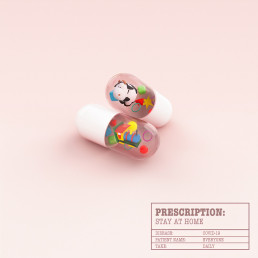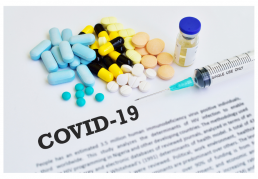Update on Potential Promising COVID Drug Treatments
Hydroxychloroquine and Chloroquine and Macrolide (azithromycin)
World Health Organization (WHO) recently announced in late May that it will temporarily pause the hydroxychloroquine arm of the Solidarity Trial as it reviews safety data. There have been several warnings of using these drugs outpatient as it may cause QT prolongation. QT prolongation is a heart complication that is harder to monitor outpatient vs in the hospital. The WHO did state that hydroxychloroquine and chloroquine are accepted as generally safe for use in patients with autoimmune diseases or malaria.
The Solidarity Trial is an international clinical trial that was launched by WHO to study treatments for COVID-19.
On May 22 data from the Solidarity Trial was published in the Lancet showing that hydroxychloroquine with or without a macrolide (azithromycin) did not demonstrate in-hospital clinical benefits in patients with COVID-19. In addition, the authors of the study reported higher mortality rates among patients receiving the drug according to the findings. WHO temporarily paused this arm of the trial, however the remaining arms of the study continued. The drug treatments that continued to be studied in the Solidarity trial were: Remdesivir, Lopinavir/Ritonavir and Lopinavir/Ritonavir with Interferon beta-1a. Later in early June WHO stated that it will resume studying hydroxychloroquine.
More about drug treatments in Solidarity Trial launched by WHO.
Remdesivir is one of the drug treatments that WHO is studying in the Solidarity Trial. Remdesivir was previously tested as an Ebola treatment. It showed promising results against Middle East Respiratory Syndrome (MERS-CoV) and severe acute respiratory syndrome (SARS) which are caused by coronaviruses and therefore suggesting that there may be promise in COVID-19.
GILEAD the manufacture of Remdesivir is studying the drug in a phase 3 trial titled SIMPLE trial. GILEAD recently announced the results of the SIMPLE trial and reported that the drug showed benefit in patients that are hospitalized by COVID and pneumonia vs placebo.
Remdesivir as of today is not FDA approved, however it has received emergency use authorization use by the FDA for emergency use for the treatment of hospitalized COVID-19 patients. As of today, Remdesivir is not available as an outpatient treatment as it is an IV agent administered by IV. Depending on whether the patient requires mechanical ventilation or not, dosing can be either for 5 days or 10 days. An initial bolus dose is administered followed by a daily dose.
COVID information is rapidly changing however Remdesivir still seems promising.
Lopinavir/Ritonavir is an FDA approved treatment for HIV. It’s tradename is Kaletra®. It is one of the drug treatments that is being studied by WHO for COVID-19 in the Solidarity Trial.
Per WHO studies for using lopinavir/Ritonavir for treatment of COVID-19 as well as MERS and SARS have been inconclusive. However, studies in the lab show that it may be effective against COVID-19 and the drug has been included in the Solidarity trial to investigate its use.
In addition to studying lopinavir/ritonavir alone for COVID-19 the combination with Interferon beta-1a is also being researched.
Interferon beta-1a is a drug used to treat multiple sclerosis. It goes by the trade name Rebif® and Avonex. The difference between the two is the dosing, route of administration and storage. From the data I could gather it appears that the Rebif, which is a premixed syringe is being used in the Solidarity trial.
In no way does this article state these drugs are treatments for COVID-19. This article is for informational purposes and any concern should always be discussed with your provider.
Reference:
- https://www.emdgroup.com/en/news/who-media-statement-07-04-2020.html. Accessed on June 3, 2020
- https://www.ncbi.nlm.nih.gov/pmc/articles/PMC7138382/. Accessed on June 3, 2020
- https://clinicaltrials.gov/ct2/show/NCT04321616. Accessed on June 3, 2020
- https://clinicaltrials.gov/ct2/show/NCT04330690. Accessed on June 3, 2020
- https://clinicaltrials.gov/ct2/show/NCT04315948?term=interferon&cond=%22Coronavirus+Infections%22&draw=2&rank=8. Accessed on June 3, 2020
- https://www.fda.gov/media/137564/download. Accessed on June 3, 2020
- https://www.who.int/emergencies/diseases/novel-coronavirus-2019/global-research-on-novel-coronavirus-2019-ncov/solidarity-clinical-trial-for-covid-19-treatments. Accessed on June 3, 2020
- https://www.nejm.org/doi/full/10.1056/NEJMoa2007764. Accessed on June 3, 2020
- https://www.remdesivir.com/us/dosing-administration/?gclid=EAIaIQobChMIw_GZ0JLn6QIVhT6tBh3k2wOeEAAYASAAEgJRpfD_BwE&gclsrc=aw.ds. Accessed on June 3, 2020
- https://www.drugtopics.com/coronavirus/gilead-announces-phase-3-trial-results-remdesivir-patients-moderate-covid-19?rememberme=1&GUID=07E9F701-1AF8-406B-9F76-31BC61376A0D. Accessed on June 3, 2020
- https://www.drugtopics.com/coronavirus/who-suspends-hydroxychloroquine-study-arm-covid-19-solidarity-trial. Accessed on June 2, 2020
- https://www.who.int/emergencies/diseases/novel-coronavirus-2019/global-research-on-novel-coronavirus-2019-ncov/solidarity-clinical-trial-for-covid-19-treatments. Accessed on 06/02/2020
COVID Drug Trials
COVID-19 Promising Drug Treatment
Three promising drug treatments for COVID-19 include remdesivir, chloroquine and hydroxychloroquine. These are prescription medications and have other FDA approved indications, with the exception of remdesivir which is not FDA indicated for any indications (not yet on the market). These drugs are showing promise in trials and case studies but none have FDA approval. This may change with further studies. For now, speak to your doctor if you have concerns and want to know if any of these treatments are right for you.
Chloroquine AND Hydroxychloroquine
A little history…
In the 17th century the indigenous people of Peru extracted the bark of the Cinchona plant to fight chills and fever. In 1633 Europe then used it for similar reasons as well as to fight against malaria. In 1820 quinine an anti-malarial drug was extracted. This was widely used as anti-malarial drug until World War II, when similar derivatives were discovered with better safety tolerability. Chloroquine was discovered in 1934 by Hans Andersag and co-workers at the Bayer laboratory. Initially when discovered the drug was ignored due to human toxicity concern. It was not until 1947 the US government expanded clinical trials and brought it into clinical practice for prophylactic treatment of malaria. A derivative of chloroquine, named hydroxychloroquine, was later approved in the United States in 1955 to treat malaria.
Studies for COVID-19…
Chloroquine has shown in preliminary studies that it may be effective in treating COVID-19 associated pneumonia. A preliminary study suggests that chloroquine is effective and safe in COVID-19 pneumonia, helping to improve lung function and shortening the disease course. By delaying the need for a ventilator, it helps delay people from going into septic shock, giving the body more time to fight off the infection.
Additional studies have determined that hydroxychloroquine and chloroquine may both be effective in inhibiting COVID-19 in vitro (not yet in actual humans). A further study concluded that hydroxychloroquine was more effective with a better safety tolerability. In a recent published study hydroxychloroquine was shown to be less toxic than chloroquine and effective in inhibiting SARS-CoV-2 (COVID-19). This study was in vitro and therefore not in human patients but utilizing African green monkey kidney.
French researchers published a small study that involved 36-patients in which hydroxychloroquine was effective in killing the coronavirus. In addition, a subset of 6 patients tested negative for coronavirus when combined with the antibiotic azithromycin.
However, many experts warn against this combination. The combination of azithromycin and hydroxychloroquine may increase QT prolongation. An increase in QT prolongation is an abnormal heart rate. If a patient is at home and taking this combination this would be difficult to monitor, vs a patient in the hospital on a heart monitor being closely watched by a healthcare team. Therefore, experts have urged that more rigorous testing is needed for this combination and for hydroxychloroquine or chloroquine alone.
Chloroquine is indicated for treatment and prophylaxis of malaria and the treatment of amebiasis (an intestinal parasitic infection). Hydroxychloroquine is currently approved for malaria prevention and treatment, lupus (SLE), and rheumatoid arthritis. Anti-malarial drugs including chloroquine and hydroxychloroquine should be avoided in people with psoriasis as this can make psoriasis worst and cause outbreaks. Of these two medications hydroxychloroquine has the least side effects for people with psoriasis. Chloroquine has contraindications for people with heart disease or diabetes.
Remdesivir
Unlike hydroxychloroquine or chloroquine remdesivir is not FDA approved for any indication.
It is a broad-spectrum anti-viral medication that was developed by a company named Gilead for the treatment of Ebola, although it has not shown to be effective against Ebola. A study demonstrated some success in treating monkeys infected by the coronavirus MERS. It is now being tested to determine if this can be applied as treatment to COVID-19. In the United States, the first US patient confirmed to be infected with COVID-19 was treated with remdesivir and the patient did recover. Further studies are needed to determine its effectiveness for COVID-19 and scientists are working on this.
None of these drugs are approved or known to be treatments for COVID-19. This article is for informational purposes only. Treatment and prevention of COVID-19 should always be discussed with your provider.
References:
- Liu, J., Cao, R., Xu, M. et al.Hydroxychloroquine, a less toxic derivative of chloroquine, is effective in inhibiting SARS-CoV-2 infection in vitro. Cell Discov 6, 16 (2020). https://doi.org/10.1038/s41421-020-0156-0
- Wang M, Cao R, Zhang L, et al. Remdesivir and chloroquine effectively inhibit the recently emerged novel coronavirus (2019-nCoV) in vitro. Cell Res. 2020;30(3):269–271. doi:10.1038/s41422-020-0282-0
- https://www.cdc.gov/malaria/resources/pdf/fsp/drugs/Chloroquine.pdf. Accessed on March 21, 2020
- https://www.psoriasis.org/about-psoriasis/causes. Accessed on March 21, 2020
- https://www.ncbi.nlm.nih.gov/pubmed/19836374 Access on March 21, 2020
- https://www.pdr.net/drug-summary/Chloroquine-Phosphate-chloroquine-phosphate-3418. Accessed on March 21, 2020
- https://www.gilead.com/purpose/advancing-global-health/covid-19. Accessed on March 21, 2020
- https://www.scmp.com/news/world/united-states-canada/article/3050949/us-coronavirus-patient-who-was-worlds-first-treated. Access on March 21, 2020

